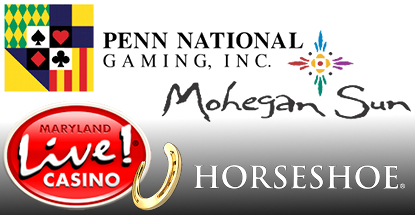 Regional casino operator Penn National Gaming lost $250.4m in Q4, but the numbers were laid low by a $316.5m non-cash impairment charge. The company, which operates 26 gaming facilities across 16 US states and one Canadian province, reported revenue of $651.4m (+!%) while earnings fell nearly a quarter to $64m in the three months ending Dec. 31. For 2014 as a whole, revenue fell over 11% to $2.56b, while earnings tumbled nearly 60% to $285.1m.
Regional casino operator Penn National Gaming lost $250.4m in Q4, but the numbers were laid low by a $316.5m non-cash impairment charge. The company, which operates 26 gaming facilities across 16 US states and one Canadian province, reported revenue of $651.4m (+!%) while earnings fell nearly a quarter to $64m in the three months ending Dec. 31. For 2014 as a whole, revenue fell over 11% to $2.56b, while earnings tumbled nearly 60% to $285.1m.
Discounting the effect of that impairment charge, Penn CEO Timothy Wilmott heralded his company’s Q4 performance, which was also negatively impacted by $4.3m in unplanned lobbying expenses ahead of the Massachusetts casino referendum. Wilmott said Penn’s new slots parlor in Plainsville is set to open in June and the $360m Hollywood Casino-branded property outside San Diego on the Jamul Indian Village land will open in mid-2016.
MOHEGAN SUN’S FIRST REVENUE GAIN IN THREE YEARS
The Mohegan Tribal Gaming Authority (MTGA) reported a healthy turnaround in its fiscal Q1. Revenue in the three months ending Dec. 31 nudged up 1.2% to $316.7m, which sounds minimal until you realize it’s the largest gain since Q1 2012. The MTGA operates its flagship casino in Connecticut and the new Mohegan Sun Pocono in Pennsylvania, which just completed its first full year of operation. The MTGA also manages the Resorts Casino Hotel in Atlantic City.
Slot revenue was basically flat at $197.9m but table games were up 4.6% to $79m. The $14.8m in quarterly profit was a welcome change from the $67.3m loss in the same period the previous year, which was saddled with a $62.1m debt payment. Cost cutting was a big factor in this quarter’s profit, as the company has about 400 fewer employees from the same time last year.
MTGA CEO Mitchell Etess told analysts that “one quarter does not make a trend” but the company was “nonetheless encouraged” by the results. The MTGA will soon break ground on a second hotel in Connecticut, adding 400 rooms to its existing 1,200. Etess said the property is often forced to turn guests away because they’re fully booked, resulting in “hundreds of thousands” of missed booking opportunities over the course of a year.
MARYLAND CASINO SWAP SLOTS FOR TABLES
Maryland’s two leading casino operators have received permission to swap some of their slots for more table games. On Thursday, the Maryland Lottery and Gaming Control Commission unanimously approved requests by Maryland Live and the new Horseshoe Casino Baltimore to cut their slots by 300 units apiece. The change will reduce Maryland Live’s complement of slots to 3,922 and the Shoe’s to 2,200. Maryland Live plans to add 13 new tables while the Shoe will add 30 tables.
Revenue-wise, it’s a no-brainer for the casinos. Casino consultant Will Cummings estimates that the average slot at Maryland Live earns the casino $260 per day while the average table earns $4,400. But the state takes a much bigger slice of slots revenue – 67% at Maryland Live, 61% at the Shoe – compared to just 20% on table revenue. Cummings estimates the slots-for-tables swap will initially cost the state about $500k in annual tax revenue but the long-term impact will be “more positive.”






